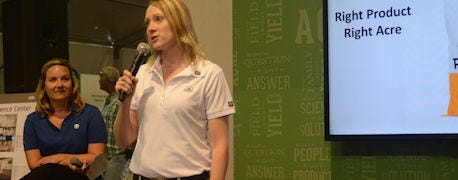
DuPont Pioneer announced the construction of two state-of-the-art Integrated Seed Science Centers at the Farm Progress Show in August.
"Seed treatments provide protection against early season pests and diseases, and also help establish stand and early plant vigor," says Keri Carstens, Senior Manager, Integrated Product Research and Stewardship at DuPont Pioneer. "A seed treatment can be made up of insecticides, nematicides, fungicides and other amendments. It's not just one compound or one active ingredient. It's a unique recipe that helps provide protection and get that plant off to the right start."

RIGOROUS TESTING: The two centers will enable Pioneer to bring robust agronomic trials to its seed treatment enterprise, says Keri Carstens, Senior Manager, Integrated Product Research and Stewardship at DuPont Pioneer. "We aren't bringing you a seed treatment that has not been tested," she says. "It's been rigorously tested in many seasons across the growing region and across Pioneer genetics."
As part of this venture, DuPont launched several new seed treatment products this year under the DuPont Lumigen brand, including Dermacor seed treatment products in the Brazilian soybean market and DuPont Lumiderm insecticide seed treatment for canola in Canada. DuPont is launching DuPont Lumivia insecticide seed treatment for 2015 U.S. spring planting. It will be available in the Pioneer Premium Seed Treatment lineup as PPST 250 plus DuPont Lumivia for select Pioneer brand corn products.
New facilities devoted to seed treatment
The two centers, in Wilmington, Delaware and Johnston, Iowa, will be dedicated to developing and testing seed treatment formulations, applications, and seed handling techniques, says Jeff Daniels Global Technical Agronomy and Application Lead for the DuPont seed treatment enterprise. "These Integrated Seed Science Centers will enable us to more thoroughly evaluate formulations, recipes, and equipment, to more comprehensively understand the seed treatment process and the products that are used," Daniels says.
The Wilmington, Delaware center, set to open in fall of 2014, will focus on development and special projects – including developing treatment formulations. This facility will feature an environmental chamber to mimic the environmental situations seed is treated in.
The Johnston, Iowa facility, which will open in late summer 2015, will focus on pre-commercialization, training, and stewardship. Like the Wilmington facility, it will have an environmental component, but will be larger in scope to use large equipment to mimic production plants and mimic application of products on location. This gives a chance to pre-test products before moving to production plants and sales reps.
"Seed treatments play a vital role in a successful crop," Daniels says. "By building Integrated Seed Science Centers with a strong customer focus, we strongly believe we're bringing value to our customers, and they can have success with any seed treatment DuPont Pioneer offers."
Rigorous treatment testing
Carstens says these centers will enable Pioneer to bring robust agronomic trials to its seed treatment enterprise. There are six key areas involved when selecting and evaluating seed treatments, what Pioneer is referring to as PASSER:
Plantability: Testing and evaluation of different seed sizes and different treatments within seed sizes to help minimize or eliminate multiple seed drop and skips. Also, collaborating with equipment providers to understand new kinds of equipment coming to the marketplace.
Application: Abrasion and dust-off testing to make sure chemical is delivered to the seed as expected and to minimize off-target movement of chemical.
Seed Safety: Understanding how a treatment will perform and ensuring it has a positive impact on genetics and germination.
Stewardship: Best stewardship and management practices, as well as having a good understanding of the active ingredient and whether it's safe for the environment and the grower.
Efficacy: Evaluating how a seed treatment performs in different growing conditions, across germplasm, to have an understanding of how the recipe combination works together before it reaches the customer.
Regulatory: Ensuring treatment adheres with regulatory requirements.
"We aren't bringing you a seed treatment that has not been tested," Carstens says. "It's been rigorously tested in many seasons across the growing region and across Pioneer genetics."
For more information, visit the Pioneer website at www.pioneer.com.
About the Author(s)
You May Also Like






